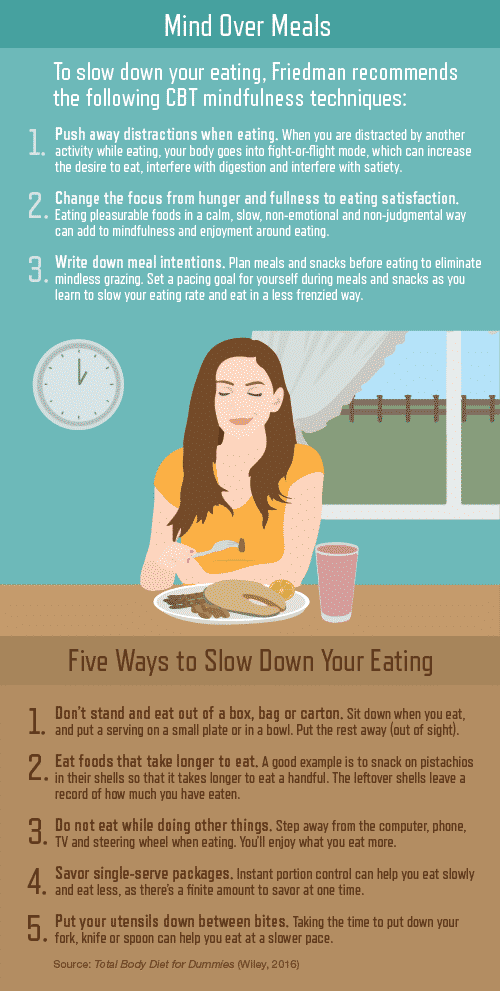Slowing down can be a challenge in our fast-paced society, but when it comes to how you eat, there can be big benefits to taking your time. Eating slower and more mindfully allows you to savor the flavors of food, as well as to enjoy the moment free of distractions. It might even help you lose weight.
“Slower eating allows our biology to work properly and [for our bodies] to be in touch with hunger and fullness signals,” explains Robert Kushner, MD, medical director of the Center for Lifestyle Medicine at Northwestern Memorial Hospital. Eating more slowly and consciously can have an effect on not just how you eat, but also how much you eat, which in turn can have a marked effect on your waistline and overall health.
“The biological mechanisms of how slower eating works to reduce caloric intake are not exactly clear, but it may allow the body to work naturally and enable signals in the gastrointestinal tract to operate properly,” Kushner says.
A 2014 review paper published in The American Journal of Clinical Nutrition, which looked at almost two dozen studies on eating rate and caloric intake, showed that when people eat slower, they eat less. The research revealed that decreases in eating rate correlated with decreases in how much food was consumed at one time. Some of the reviewed studies said that the speed of eating may influence satiety hormones; some said that there may be a learned association between the number of chews and feelings of satiation; others said that a fast eating rate was linked to less oral sensory exposure, which might lead to more food intake.
Slower eating has benefits that can impact body weight. “It is possible that slowing down eating makes eating less emotional and impulsive and more deliberate, which can have significant weight management benefits,” explains Julie Friedman, PhD, vice president of the Comprehensive Overeating Recovery Effort (CORE) program at the Eating Recovery Center of Illinois and Insight Behavioral Health Centers in Chicago.
Friedman works with patients to overcome compulsive eating behaviors through cognitive behavior therapy (CBT), which arms people with coping strategies to change negative patterns of thinking and beliefs. “Mindful eating as it relates to weight management is really about decreasing uncontrolled eating, tendency to binge eat, depression, anxiety, shame and guilt around eating, which will all indirectly benefit weight,” Friedman says.
“The biological mechanisms of how slower eating works to reduce caloric intake are not exactly clear, but it may allow the body to work naturally and enable signals in the gastrointestinal tract to operate properly,” Kushner says.
With the weight loss industry fixated on finding the latest elixir for trimming down, the answer to losing weight may be to stop multitasking, slow down and listen to your own internal hunger and fullness cues. It’s important to create the intention of eating slower before sitting down to eat. “Quick eaters typically blow past their natural fullness signals,” Kushner explains.
Slowing down can help you pay attention to how much you are eating. You can eat a lot of food in 10 minutes and go back for more without realizing that you are full. “Our goal is to extend the length of the eating experience [for patients] to give the brain and hunger hormones a chance to catch up,” says Erin McCarthy Utz, RD, registered dietitian at the Center for Lifestyle Medicine at Northwestern Memorial Hospital. “Before getting more food, I recommend setting a timer for five minutes and checking in with your hunger level when the timer goes off.”
While there are many ways to slow down and savor the food you eat, a few that resonate with weight management professionals are chewing food well, taking smaller bites, eating in a quiet space, putting utensils down between bites and assuming the tempo of another individual who is eating slowly. Try this the next time you are eating with others and you might establish a new, slower eating rate yourself.

Victoria Shanta Retelny, RDN, is a lifestyle nutrition expert and author of Total Body Diet for Dummies. Follow her @vsrnutrition.












